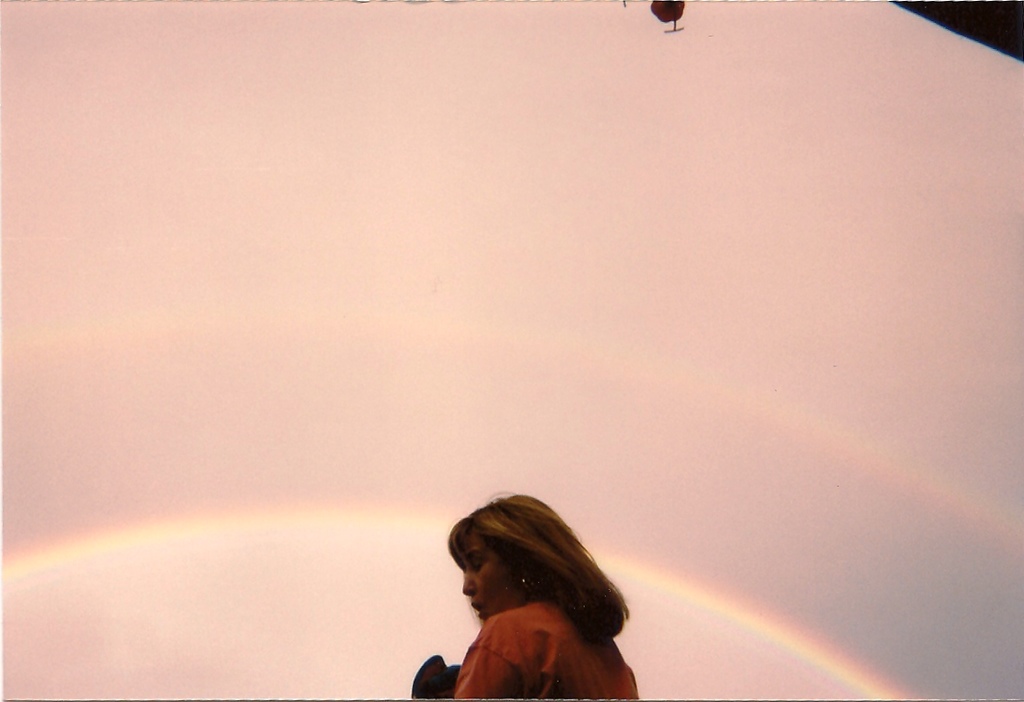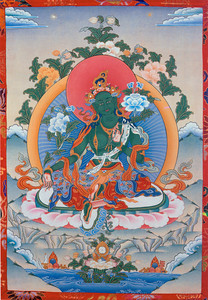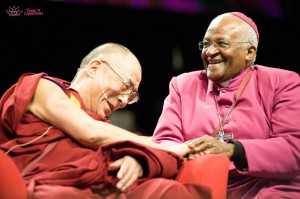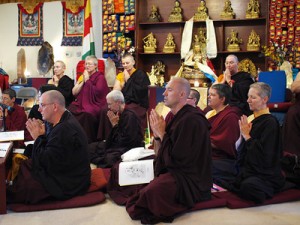The following is from a series of tweets by Jetsunma Ahkon Lhamo:
Hello all! I’ve now got my blackberry replaced. It died from a coffee spill. RIP li’l feller.
Now at my destination I am resting and will soon begin retreat in earnest. All has been travel, stay overs, re-connecting with the people of Palyul — so good.
Now resting, study, practice.I will be back eventually, when it is safe, I’m healthier, and justice is finally done. I look forward to returning home. Grateful for the love and care I have been shown.
Photos newly dug up are now available. At last the splendor of Palyul is here for all!I have so much to share with you! Ancient stories, teachings, modern from the heart teachings too. Slowly, one step at a time.
I’ve asked my students to keep up with the Occupy DC movement, and to help them. For now, hearty Tibetan soup, called tukpa with barley dough balls. Best food there is. Can we get more support to feed vegetarians please? And boiled eggs always help. Plus fresh fruit and coffee!
Here I am treated like a queen. And want to be sure all are treated so well.
My back is pretty messed up so I have to stay off my feet some, and walk with sticks some. I must conquor this pain!
But in every other way it’s all good. I’m so much less stressed not having to look over my shoulder to see if I’m being followed. This is pure bliss and peace here. And inspiring too. It feels like a whole new chapter of life, at least my life is about to begin. I just need the opportunity that comes with safety and Bodhicitta, and will do all I can for sentient beings. That is all that matters to me. To postulate about Dharma is useless. To bring the love is without question the way to awakening and peace!
OM MANI PEDME HUNG!
Jetsunma Ahkon Lhamo
Guide Your Life With Right Though Part 1: Full Length Video Teaching
The following is a full length video teaching by Jetsunma Ahkon Lhamo offered at Kunzang Palyul Choling:
Right thought is part of the 8-fold Path first taught by the Buddha as he described the method for exiting suffering. Jetsunma explores the concept of right thought and how i weaves with your karma to affect your experiences now and in the future.
© Jetsunma Ahkön Lhamo All Rights Reserved
Guide Your Life With Right Thought: Part 1
The following is a full length video teaching offered by Jetsunma Ahkon Lhamo at Kunzang Palyul Choling:
Right thought is part of the 8-fold Path first taught by the Buddha as he described the method for exiting suffering. Jetsunma explores the concept of right thought and how it weaves with your karma to affect your experiences now and in the future.
© Jetsunma Ahkön Lhamo All Rights Reserved
Liberate Your Mind
An excerpt from a teaching by Jetsunma Ahkon Lhamo from the Vow of Love series
There are many Dharma practitioners who practice for many years, go on retreat, and even take ordination. Then at some point, some karmic switch flips in their minds and suddenly they’re finished with Dharma! They don’t want to do Dharma anymore. They’re on to something else. We may think that’s strange, but it has happened, especially to Westerners. It’s not uncommon for a Westerner to practice Dharma sincerely and then flip tracks, and go back into a very ordinary kind of life. That need not happen to you. But it could. You should face that possibility.
The antidote for that event is to cultivate compassion in your mind every day. If you move along the path of Buddhadharma and become overworked by it, thinking, “I just can’t practice that many hours a day. I cannot do this activity that propagates the Dharma anymore. It’s just too much.” If you become dry inside, if you think you just can’t go on, there’s only one way that that could happen to you. You have forgotten the suffering of others.
You must cultivate the memory that even in this visible world where beings can be seen, there is suffering that you cannot comprehend. You must think that there are children being abused everywhere, that there is starvation and poverty. You must think about the terrible diseases that afflict the body, speech and mind. You must think about the horrible things that come along with suffering, and the depth of suffering that exists, even in the realms that you can witness. If you think about that everyday, more about that than you do about yourself, you will not fall off the path of Dharma. When you become weak, when you waiver, that is when you forget. That is when you think the path is all about you. It’s when you forget that you are practicing for their sake, and that you are practicing also to liberate your mind so that you can be of benefit to others.
A non-Buddhist practitioner might say, “I’ve got another idea. Why don’t I do what I know how to do best. I’ll go out and make some money, and then I’ll feed everybody. I can do that.”
I’ll tell you a story about when I went to India. In our innocence, we thought, “Let’s go see Bombay; this is really going to be great.” So we got in a taxi and we went through the streets of Bombay thinking that we were going to see the India on the postcards. What I saw were streets so filled with sickness – leprosy, deformity, unbelievable poverty – that I couldn’t see anything else. I know there were beautiful buildings. I know there was beautiful scenery, but I couldn’t see those things.
Every time the taxi stopped, people with only part of a limb and open sores of leprosy would stick their arms in the car and beg. Mothers would hold up their babies that they had done something to, saying, “Help us, help us.” So I started passing out dollar bills to everyone. I soon realized I was in deep trouble as I only had a limited amount of money, but that didn’t stop me.
I was traumatized by this. I was crying to the depth of my heart, because I had known that suffering existed, but I was used to my brand of suffering. I had never seen anything like this. I continued to pass out dollar bills, and finally the taxi driver stopped. He turned around and said, “Lady, don’t do this anymore. What is one dollar going to do for these people? Maybe they’ll eat today. What will you do for them tomorrow? And if you give out one dollar to everyone you see, there are so many people like them in India, you couldn’t help them all.” His saying that shocked me; he was right. Even if I could manage to become wealthy, I couldn’t feed the world. And hunger is only one kind of suffering. How can you help the other kinds of suffering? This kind of ordinary compassion ultimately does no good.
Why are those people suffering in India, and why were you born here in the West where things are relatively comfortable? Why are there animals and why are there humans? Why are there other realms of existence? Why is there so much suffering in one place, and much less suffering in another place? It is because of karma. That is the reason for all of this. Yet there is a cure for negative karma, which is the kind of karma that causes suffering. Ultimately, it is the only cure that will work. That cure is the eradication of hatred, greed and ignorance from the mindstreams of sentient beings. And the root of hatred, greed and ignorance is desire.
This doesn’t mean if we see starving people we shouldn’t feed them, that we should immediately teach them the Dharma. That, of course, won’t work. We have to be skillful. If people are hungry, we feed them first, and then we teach them. But your job now is to do neither. You might not have money, and you might not have the ability to teach just yet. But you can do something. You can practice Dharma in such a way that you, yourself, become free of hatred, greed and ignorance. You can practice so that you can liberate your mind from cyclic existence for one reason and one reason only: that after liberating your mind, you can emanate in a form that will continue to benefit beings. You can liberate your mind from desire to such a degree that you have only one hope, and that hope is that you will be born again and again in a form that will bring this antidote to other suffering beings. That’s what you can do.
© Jetsunma Ahkön Lhamo
Seeking Safety and Peace
The following is from a series of tweets by Jetsunma Ahkon Lhamo:
Finally, some coverage here, I can check in with my twitter buddies. I miss connecting. Seems we’ve been moving forever. Unsettling. If you aren’t used to it. And to be safe we’ve been learning to be hyper-alert, stay packed, be willing to eat from McDonalds (AAAAK!)
I feel like I’m in China with the constant minders minding me. Or North Korea. Ah, I guess it could be worse. My stalker could have found and killed me already. I’m still alive so far. Just running. And staying safe.
If and when I reach a safe place to stay I want to go into deep practice and stay there. My mind is affected by the trauma and danger, so I need to heal. Deeply. I’ve no strength at all, and must get my strength back.
I have an RV which would have made all this so much easier! But it is a big target.
As you know by now I’m not safe as the judge dismissed the case, US vs Cassidy. Even though he has a felony record and is known to be violent, especially with women. He’s an arsonist too.Therefore I have turned to victim’s advocates and others for help. There is help for women. But it is hard to find.
I pray for a successful appeal and outcome. What a beautiful day for women. One more step toward respect and safety, toward being heard. Successful women should not be punished for what we do. We should be commended for our contributions, and be allowed the safe passage through our lives in peace!I want to say as well, that I believe in a Woman’s power to change the world. We can do it.
Heart Advice for Degenerate Times
The following is a full length video teaching offered by Jetsunma Ahkon Lhamo at Kunzang Palyul Choling:
Every little bit of virtue counts these days – remember to dedicate everything to all beings – that their liberation will be swift and complete.
© Jetsunma Ahkön Lhamo All Rights Reserved
Why Compassion?
An excerpt from a teaching by Jetsunma Ahkon Lhamo from the Vow of Love series
I would like to talk about a subject that is of the utmost importance to everyone. The subject is compassion.
You may think, “Oh, I know all about compassion. I’ve been a Dharma practitioner for a long time. I’ve had many teachings about compassion.” Or you might think, “I’m a person with a good heart. I try not to do any harm, and I try to help people. Therefore, I know about compassion.” If we hold these ideas in our heart, we have already lost precious opportunities, and will continue to lose more, because the cultivation of compassion in the heart and mind is an ongoing process.
Even if you come into this world with a compassionate ideal you must still cultivate the idea of compassion as though it were the first time you ever thought of it. Due to intense spiritual practice in the past, you may have been born into this lifetime with the idea that you want to be of benefit to sentient beings. Yet still you must cultivate the idea of compassion everyday, as though it were a delicate orchid that could die in an unnatural environment. Until we are supremely enlightened, we have obscurations of our mind that will fight against the idea of compassion.
There is no one on this earth, unless they are supremely realized, who has the purified mind of compassion. If you have been meditating for many years, and think compassion is a baby subject and you’re far beyond that, or if you think because you’ve practiced for a long time, compassion is just one of the beginner studies, and now you’d like to get on to the mystical or the “higher” Dzogchen teachings, then I think you’re making a mistake. I hope that you will relax your mind and come to the point where you commit to studying compassion deeply and profoundly, as though it were your mother. You should have that kind of intimate relationship with the idea of compassion. You should seek to be taught by it. You should seek to be suckled by the mind of compassion. You should seek to be nourished in that way.
© Jetsunma Ahkön Lhamo
His Holiness Kyabje Dungsey Thinley Norbu Rinpoche
With the passing of Thinley Norbu Rinpoche, the world has lost another great Lama. Thinley Norbu Rinpoche was considered one of the greatest mahasiddhas of our time. Rinpoche was very close to my own root teacher, His Holiness Kyabje Drubwang Penor Rinpoche. In fact, His Holiness Penor Rinpoche respected Thinley Norbu Rinpoche so much that he was one of the very few Lamas for whom His Holiness would stand up to greet when Rinpoche entered the room.
I had the tremendous blessing to visit Rinpoche a number of times, and each time he had very beautiful advice for me. Thinley Norbu Rinpoche told me that I could always come and practice with him, particularly if my life force was weak. I had always intended to go, and wish I had. But in 1991 Rinpoche came to pay a surprise visit to my center, Kunzang Palyul Choling in Maryland, and gave a spontaneous teaching to the students that were there, and we were able to meet again. Rinpoche was a sublime writer. Every book he has written is pure nectar.
Yesterday morning, I woke thinking of Rinpoche, and then learned of his passing. I am full of grief on behalf of sentient beings for the loss of Rinpoche.
Ahkon Lhamo
Thinley Norbu Rinpoche wrote a number of books, all of which are sublime. They include:
The Small Golden Key – To the Treasure of the Various Essential Necessities of General and Extraordinary Buddhist Dharma
Magic Dance – the Display of the Self-nature of the Five Wisdom Dakinis
White Sail – Crossing the Waves of Ocean Mind to the Serene Continent of the Triple Gems
Practice of the Essence of the Sublime Heart Jewel, the Propitious Speech from the Beginning, Middle and End by Patrul Rinpoche (Translation)
Welcoming Flowers From Across The Cleansed Threshold Of Hope
A Cascading Waterfall of Nectar
The Great Image – The Life Story of Vairochana the Translator
Gypsy GossiP
A Brief History of a Himalayan
Echoes
Sunlight Speech that Dispels the Darkness of Doubt
To read more about Thinley Norbu Rinpoche, please visit Thinley Norbu – Wikipedia, the free encyclopedia
Bring the Love
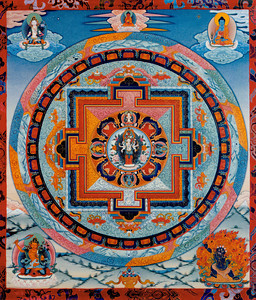
From The Spiritual Path: A Compilation of Teachings by Jetsunma Ahkon Lhamo
All Dharma, your practice, your teachers, and everything you have ever encountered that has brought you closer to enlightenment—is only one thing: a manifestation or an emanation of the enlightened, compassionate intention of the Buddha. That is why this path appears and why we are able to practice Dharma. If you wish to follow this path, abandon your drunken, compulsive need to be right, approved of, admired. You must rely on the Buddha’s great intention. And after you finally arise in the awareness of your own primordial-wisdom nature, you will of necessity appear again and again to benefit beings. For it is the nature of that state to do so. That pristine state appears in an emanation phase—a spontaneous, natural movement that we may call love.
Who stops the love? You do. Every moment you believe that you are inherently real, you stop loving. Every moment you focus on your “self” and its needs, you stop loving. As your churning desire compulsively creates a deluge of thoughts, you stop loving. As long as you hold on to a “self” and the idea of its eternal existence, you will never be anything but a cheap imitation of the supremely awakened mind. I asked a wonderful yogini in Nepal, “What would you say to women in America who are practicing?” She said, “Well, this applies to everyone, but especially to women. Have courage.” Your practice is meaningless—it amounts to nothing—unless you have courage. You must be strong. You must not let anything stop you. With that fearlessness, you can break through the lethargy in your life; you can break through the barriers that keep you from practicing sincerely; you can even break through the old ideas that keep you mired in garbage. You can understand that by believing in a surviving, eternal ego, you are following a fool off a cliff.
© Jetsunma Ahkön Lhamo
Western Baggage and Eastern Philosophy
From The Spiritual Path: A Compilation of Teachings by Jetsunma Ahkon Lhamo
As human beings, we avoid looking deeply at our ingrained habits and beliefs. We avoid testing them for the qualities needed to develop properly on the Vajrayana path. It’s easier to “go with the flow.” We dislike challenging ourselves. Most of all, we dislike change. We are somehow more comfortable with remnants of our old beliefs, translated into Dharma terminology.
Eastern philosophy is difficult for Westerners to understand. There are so many major differences, including the basic premise and the value system. Though the various motivations for practice set forth by the Buddha are universally true, people tend to select what resonates most with what they learned while growing up. Your culture strongly influences your reasons for practicing Dharma—and how you under-stand it. Those whose needs are generally satisfied react very differently from people who have seen war, suffering, and famine. The latter tend to hang on to Dharma for dear life. But many Dharma-practicing Westerners complacently think: “If I can just get another precious human rebirth, I’ll be okay.”
Not so for those who have seen intense suffering. They are apt to think: “I want out. I want my mind to be free of the causes of suffering. I am sick of revolving helplessly on this wheel. I’m tired of watching my loved ones go hungry and die young.” When you have seen war, you know that death could be just a moment away. But we Westerners rely on medical marvels. We have faith that if someone can just get us to the hospital in time, we will be saved.
The great blessing here in the United States is that many people have a strong karmic relationship with compassion. Thus, I talk more about compassion than about suffering. But it may not be enough to practice Dharma because you feel a sense of mission and purpose—however pure your intention might be. That is not the same as hanging on to Dharma for dear life. If you have not understood in the depths of your being how impermanent this life is, if you have not really understood the terrible prospect of revolving endlessly in cyclic existence—you tend to be much more casual in your attitude toward practice. You may not challenge yourself to do your best.
Westerners need a constant shot of inspiration. We seek it out. We eat it like candy, and we love it! But just like candy, it soon lets us down. And even if we practice with the intention to help sentient beings, there is still a catch: our practice gives us a sense of identity. Right now, your sense of identity determines why you live, what you do, what is important to you. But it also makes you a traveler who is standing still. We can move very fast in our practice and yet remain quite stiff inside. If we practice because we want to be a good person who helps others, we become comfortable with that identity. We do not feel the urgency of someone living with the constant threat of being bombed—or someone who has known hopeless hunger.
We may adopt some new ideas, but our beliefs are basically unchanged. And so is our predicament. We still believe that we will exist as we are forever, if not in the same body, then with the same consciousness. We hope to attain the goal of realization as ourselves. We believe we can keep ourselves intact, and then, we will somehow appear in a celestial form in order to benefit beings. As to what we will actually do, we vaguely envision bringing love and light to the world, the bounty of our great wisdom. And to do that, we will continue to exist in some way that is recognizable to us.
We have now come to a delicate but crucial distinction, and we must tread carefully. We pray to retain awareness throughout the process of death—so that during the bardo transference we can achieve realization or, at least, rebirth in a most fortunate way. We also want to come back in an emanation form in order to benefit beings. However, we may not yet have really challenged our ideas of foreverness and sameness. That is, we haven’t given up on ego, on surviving. This is a product of our culture. Christians aspire to survive death and go to heaven. A Buddhist, however, hopes to remain awake and not faint during the time of transference in the bardo state, but understands that what remains is not the self or the ego: it is awareness itself, the pure, essential mind-nature, unobscured, un-hindered by dirty winds and channels. It is not the natural state of you, the person you are right now. If you are hoping that this “you” will remain intact, you have a different religion programmed into your brain. The correct goal is not to survive in an eternalistic way, reaching a heaven-like Dewachen and then returning as a Buddhist angel to help people.
When you pray for others, do you wish for all sentient beings to know love and light? As Buddhists, we can no longer have this as our prayer. Why? When you do that, you are wishing for sentient beings to remain intact forever, revolving in a state of impermanence. This is very different from praying that the causes for suffering will be erased from their minds, that they will realize the primordial-wisdom state.
What should you as a Buddhist hope for? That when you enter into the bardo, or into your prayers, or even into the next moment, you will instantly come to know the emptiness of all phenomena, the emptiness of self-nature. Self-nature is like a puffball. You should pray to see it for what it is: poof! Just like that. You should pray with all your heart to realize the primordial, natural, pure view—the Nature which is free of all concepts, all mind-chatter. That Nature miraculously survives beneath all the garbage we pile on top of it. That Nature is pure, all pervasive, with neither beginning nor end. When you attain that view, form and formless are seen to be the same, and self is only luminosity.
© Jetsunma Ahkön Lhamo
